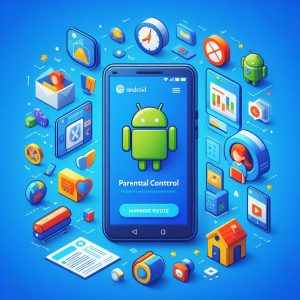I. Introduction
Parental control apps allow parents to monitor and restrict their children’s activity on mobile devices. With the rise in smartphone usage among kids, these apps have become important for ensuring their safety and regulating screen time.
Definition of parental control app A parental control or parental monitoring app is a software designed to allow parents to oversee their children’s activity on mobile devices. It enables setting boundaries and rules to manage app usage, filter inappropriate content, track location, etc. The main aim is to protect children from threats like cyberbullying, explicit content, overuse of technology, and invasion of privacy.
Importance of parental control app Parental control apps equip parents to shield children from online dangers. As per reports, over 90% of teens go online daily and 24% are on the internet almost constantly. This underscores the need for parental vigilance. These apps allow setting screen time limits, tracking web activity and location, blocking unsuitable apps and websites, etc. Thus, they foster healthy technology habits in kids.

II. Features of a Parental Control App
An effective parental control app offers a robust set of features to support child safety and device monitoring functionalities.
Compatibility with Android versions The app should be compatible with older and newer Android versions. It ensures wider adoption across devices. Support for latest OS features like app pinning, kiosk mode, etc. also expands monitoring capabilities.
UI/UX design An intuitive user interface with easy navigation enhances usability. Controls and settings must be simple enough for parents to implement device rules effortlessly.
Security and privacy features End-to-end encryption safeguards children’s personal data. Authentication via PIN prevents unauthorized access to the app. Remote locking or data wiping capability also bolsters security.
Screen time limits Parents can preset daily or weekly time limits for app categories or individual apps basis the child’s age. It prevents excessive mobile device usage.
App blocking Blacklisting inappropriate apps and whitelisting educational apps enables parents to restrict access. Category-based app blocking like blocking all social media apps also streamlines monitoring.
Activity monitoring Detailed activity reports on texts, calls, browsing history, search terms, locations visited etc. aid parents in tracking the child’s online behavior and real-world activities.
III. Comparison of 7 Best Parental Control Apps for Android in 2024
Here is a comparison of some of the top-rated Android parental control apps this year based on crucial factors:
- Canopy Parental Control
Canopy Parental Control is an intuitive monitoring app enabling step-by-step device setup. Key features include:
- Filters web content using AI
- Sets daily screen time limits
- Tracks real-time location
- Blocks apps and games
- Monitors texts, calls and photos
- AirDroid
AirDroid facilitates remote device management via a web dashboard. Main capabilities are:
- Remotely control Android devices
- Block calls and SMS
- Monitor installed apps
- View browsing history reports
- Track location of children
- OurPact
OurPact makes screen time management very flexible. Salient features:
- Establish curfews for blocking usage
- Geofencing to restrict access based on location
- Enable web filtering through categorization
- Customize app blocking settings
- Works offline for continued enforcement
- Google Family Link
As a free parental control app from Google, Family Link allows parents to:
- Set digital ground rules for kids under 13 years
- Approve app downloads and purchases
- Set daily screen time limits
- Lock children’s devices remotely
- Track location
- Norton Family
Norton Family delivers comprehensive monitoring facilities in addition to real-time alerts about cyberbullying, suicidal ideation, etc. Main capabilities:
- Monitors texts, calls and chats
- Sends notification on detection of inappropriate content
- Sets time limits across devices
- Blocks any app
- Tracks location history
- ScreenTime
ScreenTime facilitates multiple parental controls via an intuitive dashboard. Key aspects are:
- Pause internet instantly
- Configure app and content filters
- Schedule device access as per routines
- Track social media activity
- Set screen time allowances
- Kidlogger
Kidlogger provides extensive surveillance capability to thwart online threats. It offers these functionalities:
- Monitor texts, call logs, emails, chat apps, etc.
- Capture screenshots at preset intervals
- Track web browsing history
- Listen to surroundings through ambient audio feature
- View location history
IV. Essential Tools to Develop Parental Control App
Here are some vital tools needed to build an effective parental control app:
Android/iOS Kiosk Mode Tool The kiosk mode locks a mobile device to only use certain apps. Integrating it restricts access to only approved apps as per parental rules.
Screen Pinning API It allows locking the device screen to specified whitelisted apps. Kids will be unable to open other apps or access notifications.
Geofencing SDKs These enable setting up monitored geographical zones and trigger alerts whenever the minor enters or leaves these zones.
Machine learning algorithms
ML techniques can power app capabilities like misspelled obscene text detection, child voice sentiment analysis and more.
Notification manager API It helps remotely disable notifications of distracting apps as per schedules configured by parents.
V. Cost of Developing a Parental Control App
The cost to develop a parental control app varies based on the complexity of features. On average it may cost around:
- $25,000 to $35,000 for simpler apps with basic functionalities
- $35,000 to $50,000 for more advanced apps
Additional costs for maintaining servers, adding new features, marketing etc. also need to be factored in.
VI. FAQs on Parental Control App for Android
Here are some common queries about parental control apps:
Does Android have a parental control app? Yes, Android offers Google Family Link as a free parental control app that facilitates monitoring device usage and setting digital rules for children. Many third-party Android apps like Norton Family also available.
What should I look for in a parental control app? A robust parental control app must enable setting screen time schedules, filtering web content, blocking apps, tracking location, monitoring texts/calls/chats, etc. Easy configuration of rules and intuitive dashboards are also vital for usability.

VII. Conclusion
The popularity of mobile devices among children makes parental vigilance essential. Parental control apps allow parents to protect minors from online threats like cyberbullying, explicit content, privacy invasion and digital addiction. Core capabilities like screen time management, app blocking, activity monitoring are crucial.
With cyber risks on the rise, demand for parental control apps shall surge globally. The capabilities of these apps will also expand leveraging new innovations in AI and ML. By 2025, the parental control software market is projected to reach USD 2.1 billion. As Android has 88% market share, parental control apps for Android will see higher adoption worldwide. Leading apps like Google Family Link, Norton Family and AI-based solutions will continue dominating this space.
